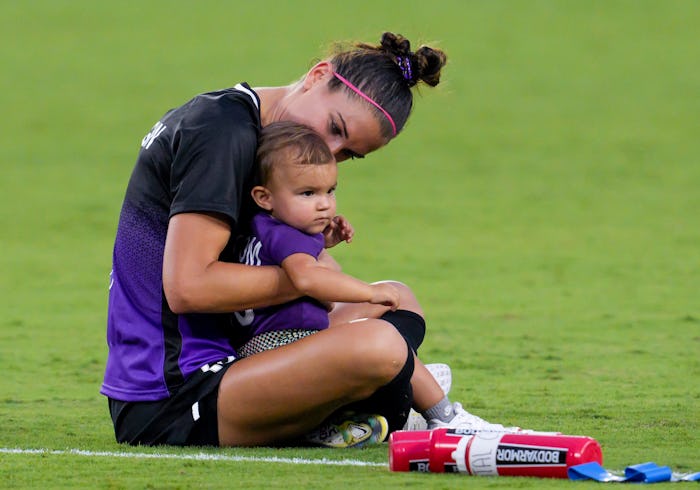Tokyo Olympics

A Quick Explainer On The Controversy Surrounding Breastfeeding Athletes & The Olympics
Whether and how breastfeeding Olympians can bring their babies to the Games has been a subject of confusion and debate for months.
Being a parent is never an easy task. Neither is being an Olympic athlete. But this year, thanks to Covid-19, both got even harder for breastfeeding parents. Restrictions put in place in an attempt to curb the spread of the virus had some Olympians, particularly breastfeeding parents, feeling torn between “being a breastfeeding mom or being an Olympic athlete.” The controversy surrounding breastfeeding and this year’s Olympics has taken several, often confusing turns over the past few months, so here’s what you need to know.
“No friends. No family. No exceptions.”
On March 20, the International Olympic Committee (IOC) announced that the Government of Japan and Tokyo Metropolitan Government had ruled that overseas spectators for the Olympic and Paraolympic Games would not be allowed, citing concerns over the spread of Covid-19. This meant family members, including children, could not come. It was a difficult blow, indeed, but for breastfeeding parents, there was an added level of complication.
Some athletes — including American runner Aliphine Tuliamuk, American soccer player Alex Morgan, and Canadian basketball player Kim Gaucher — spoke out to highlight the difficulty breastfeeding Olympians faced.
“Right now I’m being forced to decide between being a breastfeeding mom or an Olympic athlete. I can’t have them both. Toyko has said no friends, no family, no exceptions,” Gaucher said in an Instagram post on June 23. “We’ve gone through all the appropriate channels. Everyone says they’re on board but nobody can do anything.”
The IOC eventually reversed its decision, but there was still some confusion
On June 30, the IOC informed Reuters that “after careful consideration of the unique situation facing athletes with nursing children, we are pleased to confirm that, when necessary, nursing children will be able to accompany athletes to Japan.”
The reversal was hailed as a victory. “I’m incredibly happy and very thankful for all the people who fought for this and helped out with this,” Gaucher told the Associated Press. “The right decision for women in sports and we can move forward.” Companies such as Babylist even offering to help breastfeeding Olympians pay for their child to go with them to Tokyo.
But there was still confusion. “Still not sure what ‘when necessary’ even means,” tweeted Morgan, who has a 1-year-old daughter. “Is that determined by the mother or the IOC? I have not been contacted about being able to bring my daughter with me to Japan and we leave in 7 days.”
The IOC specified in their statement that nursing children would not be permitted to stay in Olympic Village, but rather in an approved hotel.
“Extremely drastic measures that make this option impossible”
On July 20, days before the opening ceremonies and the start of the Games, Spanish synchronized swimmer Ona Carbonell grabbed headlines after she posted a video on her Instagram account sharing that she would not be taking her breastfeeding son to Japan.
While she was technically permitted to bring her child, she explained, the logistics were “incompatible with my athletic performance,” proving so difficult as to be unmanageable. Her son Kai and husband Pablo would not only have to stay in a separate location, but they wouldn’t know how far the hotel would be until they landed in Tokyo, making planning ahead impossible. Moreover, her family would be unable to leave the hotel room for the entire time she was in the country (approximately 20 days). She also said she was concerned about how leaving her teams “bubble” to go to the hotel and breastfeed her child would potentially put their health at risk and, by extension, their ability to compete.
“I hope other athletes can get along with these conditions and be able to take their kids with them,” she said. “Personally, I can’t accept these conditions.”
Writing in Spanish and English, she explained that “extremely drastic measures make this option impossible for me. After receiving countless expressions of support and encouragement to go to Tokyo with Kai, I wanted to express my disappointment and disillusionment that I will finally have to travel without him.”
Some athletes have found ways to make it work
Despite the uncertainty and difficulties regarding bringing children (and support adults to provide childcare to the children), some athletes have, indeed, brought their children with them, including Gaucher and Tuliamuk, though details remain scant as to how, exactly, they’re managing.
At a news conference on July 24, Olympic organizers asserted that they made good faith efforts to try to make the Olympics accessible for breastfeeding parents while being mindful of Covid-19 precautions and edicts from the Japanese and Tokyo governments. Spokesperson Masa Takya said that while breastfeeding athletes had special dispensation to bring their children to Japan, they would not have access inside the Olympic Village in order to “have a good balance between delivering the safest, secure environment and meeting the special requests by the National Olympic Committees.”
Despite precautions, new Covid-19 cases have emerged daily since the beginning of the Games
Prior to the start of the Games, Covid-19 cases were on the rise in Japan. Despite disallowing foreign and domestic spectators, and the heightened precautions imposed on nursing athletes and their children, more than 193 cases of the virus have been detected among athletes and personnel since the start of the Games, according to Olympic organizers.
Coordinating logistics to keep everyone safe in Tokyo has been a challenge with myriad shortcomings. And, as has been the case throughout the pandemic, moms have often borne the brunt of trying to figure out many of the logistics on their own.